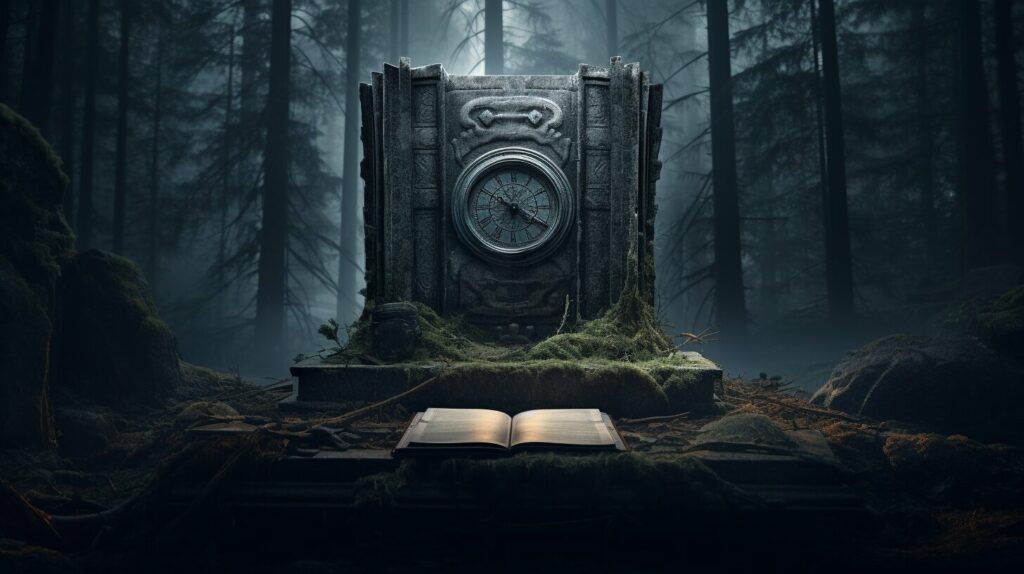Have you ever woken up from a dream about your past and wondered what it meant? Dreams about the past can be puzzling and leave you feeling confused. However, understanding their meaning can provide valuable insights into your subconscious thoughts and emotions.
Many people believe that dreams are a reflection of our waking life experiences and can reveal aspects of our past that we may have forgotten or repressed. Dream interpretation is the process of analyzing the symbolism and meaning of our dreams to gain a deeper understanding of ourselves.
Key Takeaways:
- Dreams about the past can reveal subconscious thoughts and emotions.
- Understanding the meaning of these dreams can provide valuable insights into our lives.
- Dream interpretation can help us gain a deeper understanding of ourselves.
The Importance of Dream Interpretation
Dream interpretation is the process of analyzing and understanding the meaning of dreams. Although dreams are often dismissed as meaningless or random, they can hold valuable insights into our subconscious thoughts and emotions.
Interpreting dreams can provide a deeper understanding of our past experiences and their impact on our present lives. Dreams can reveal unresolved issues, fears, desires, and other emotions that may be affecting our waking lives. By exploring these themes, we can gain a better understanding of ourselves and our inner world.
The Benefits of Dream Interpretation
There are several benefits to interpreting dreams, including:
- Building self-awareness: Understanding the symbolism and meaning behind our dreams can help us recognize patterns in our thoughts and behaviors.
- Providing insight into our emotions: Dreams can often reveal repressed or hidden emotions that we may not be consciously aware of in our waking lives.
- Fostering personal growth: By analyzing our dreams, we can gain a deeper understanding of ourselves and work towards personal growth and development.
How to Interpret Dreams
Interpreting dreams can be challenging, but there are several strategies that can be helpful:
- Keep a dream journal: Recording your dreams regularly can help you identify recurring themes, symbols, and emotions.
- Focus on symbolism: Dreams often use symbolism to convey meaning, so pay close attention to any symbols or motifs that appear frequently in your dreams.
- Consider the context: The context of a dream can also be important in interpreting its meaning. Consider the people, places, and events that appear in your dream and how they relate to your waking life.
- Seek professional guidance: If you’re struggling to interpret your dreams on your own, consider consulting with a therapist or dream analyst who can provide guidance and support.
By using these strategies, you can begin to unlock the meaning behind your dreams and gain a deeper understanding of yourself and your subconscious mind.
Understanding Dream Symbols
When it comes to dreams about the past, understanding dream symbols is crucial in deciphering their meaning. Dream symbols can provide insight into the emotions and experiences that may be affecting our present lives.
Dream symbols can be anything from a person, an object, an animal, or a place. These symbols are not always straightforward and can sometimes be difficult to interpret. For example, a dream about a snake could represent both fear and transformation, depending on the context of the dream.
To decode dream symbols, it’s important to analyze the emotions and events that occurred in the dream. Begin by identifying the most prominent symbol in the dream and then consider its context. Was it a positive or negative experience? Did it occur in a specific location or with certain people?
Common Dream Symbols
| Symbol | Meaning |
|---|---|
| Water | Emotions or the subconscious mind |
| Childhood home | Family dynamics or early experiences |
| Ex-partner | Unresolved feelings or issues from the past relationship |
| Death | Endings or transitions |
It’s important to note that different people may have different associations with certain symbols. For example, a snake may represent fear for one person, while for another, it may represent healing or transformation.
By understanding the significance of dream symbols, individuals can gain a better understanding of their subconscious thoughts and emotions. This knowledge can then be applied to their waking life, aiding in personal growth and development.
Decoding Dreams About the Past
Decoding dreams about the past can be a challenging task, but it can also provide valuable insights into our subconscious mind and unresolved issues from the past. Here are some practical tips and techniques to help you get started:
- Keep a dream journal: Writing down your dreams in a journal can help you identify recurring themes and symbols. It can also aid in recognizing patterns and changes in your dreams over time, providing a deeper understanding of their meaning.
- Analyze recurring themes: If you notice certain themes or symbols that appear repeatedly in your dreams about the past, take note of them. These may represent unresolved issues or emotions that need to be addressed in your waking life.
- Consider the context: The context of the dream, including the environment and the people present, can provide clues to its meaning. Think about how each element relates to your past experiences or current life situations.
- Seek professional guidance: If your dreams about the past become recurring or intensely emotional, it may be helpful to seek professional guidance from a therapist or dream analyst. They can provide deeper insights into the meaning behind your dreams and offer strategies for processing past experiences.
- Reflect on your emotions: Pay attention to the emotions you experience in your dreams about the past. They may indicate unresolved feelings related to past events. Analyzing these emotions can offer valuable insights into your current emotional state and areas where you may need healing.
By incorporating these tips and techniques into your dream analysis, you can gain a deeper understanding of your dreams about the past and use them as a tool for personal growth and self-reflection.
Symbolism of Common Past Dreams
Dreams about the past come in a variety of forms, each with its own unique symbolism and meaning. Here are some common past dreams and what they may represent:
| Dream | Interpretation |
|---|---|
| Revisiting childhood memories | May symbolize a desire to reconnect with simpler times or to explore unresolved childhood issues. |
| Encountering past relationships | May represent a need for closure or a desire to reconcile with a former partner or friend. Alternatively, it may indicate a fear of repeating past mistakes. |
| Reliving significant events | May suggest a need to process and come to terms with a traumatic or emotionally charged experience. |
It is important to note that the meaning of a dream can vary based on the individual’s personal experiences and emotions. It is up to the dreamer to reflect on their own thoughts and feelings to determine what a dream might be trying to communicate.
How Past Dreams Relate to Your Life
Dreams about the past can reveal a lot about your current emotional state and experiences. Although they may seem unrelated to your present life, these dreams often serve as a reflection of unresolved issues or unprocessed emotions that still affect you.
For example, revisiting childhood memories in dreams can be a sign of unresolved trauma or a desire for comfort and security. Dreams of past romantic relationships can indicate a need for closure or a fear of intimacy in current relationships. Reliving significant events can represent a desire to revisit or change the past.
Understanding these connections can help you gain valuable insight into your subconscious thoughts and emotions. By reflecting on the themes and symbols in your dreams about the past, you can identify areas of your life that may need attention or healing.
It’s important to note that not all dreams about the past have a significant meaning. Sometimes, they may simply be a reflection of your memories or a way for your brain to process information while you sleep. However, if you find yourself having recurring or emotionally intense dreams about the past, it may be worth exploring their meaning.
Using a Dream Dictionary for Interpretation
Dream dictionaries can be a helpful tool in interpreting the symbolism of your dreams. These dictionaries provide explanations for common dream symbols, allowing you to gain insight into the meaning behind your dreams about the past.
To use a dream dictionary effectively, begin by identifying the key symbols present in your dream. Look up these symbols in the dictionary and read the corresponding explanations. Keep in mind that symbols may have different meanings based on context and personal association, so it’s important to consider your own emotions and thoughts when interpreting your dreams.
It’s also important to remember that dream dictionaries should not be used as a definitive guide. Rather, they should serve as a starting point for your interpretation. Use your own intuition and personal experiences to determine the significance of each symbol in the context of your dream.
Seeking Professional Help for Dream Analysis
While keeping a dream journal and analyzing recurring themes can be helpful for interpreting dreams, there may be times when seeking professional help becomes necessary. Recurring or intensely emotional dreams about the past could be a sign of unresolved issues that require further exploration.
Consulting with a therapist or dream analyst can provide additional insights and guidance in understanding these dreams. They can help identify patterns and themes, offer interpretations, and provide tools for processing emotions related to past experiences.
When to Consider Professional Help
If dreams about the past are causing distress or impacting daily life, it may be helpful to seek professional help. Additionally, if a dream is particularly vivid or intense, it may be worth discussing with a professional to gain a deeper understanding of its meaning and significance.
It’s important to remember that seeking professional help for dream analysis is nothing to be ashamed of. Dreams can offer powerful insights into subconscious thoughts and emotions, and consulting with a professional can aid in personal growth and healing.
Incorporating Dream Analysis into Your Life
Dream analysis is a powerful tool for gaining insight into one’s subconscious thoughts and emotions. By reflecting on dreams and identifying symbols and themes, individuals can gain a deeper understanding of themselves and their past experiences. Here are some ways to incorporate dream analysis into your daily life:
- Keep a dream journal: By recording dreams in a journal, individuals can track recurring themes and symbols, and begin to identify patterns in their dreaming.
- Reflect on dreams: Take some time each morning to reflect on the dreams from the previous night. Consider elements such as emotions, people, and surroundings, and try to identify any underlying themes.
- Consult dream dictionaries: Use a dream dictionary to look up the meanings of symbols and themes in dreams. This can be a useful starting point for interpretation, but it’s important to remember that interpretations are subjective and may vary.
- Work with a professional: If dreams about the past become recurring or emotionally intense, it may be helpful to seek the guidance of a therapist or dream analyst. They can assist with interpretation and offer insights into the meanings behind these dreams.
- Use dreams for self-reflection: Dreams can provide valuable insights into one’s thoughts, emotions, and past experiences. Use dream analysis as a tool for self-reflection and personal growth.
Conclusion
Dreams about the past hold significant meaning and can offer insights into our subconscious thoughts and emotions. By interpreting the symbols and elements within these dreams, we can gain a deeper understanding of our past experiences and how they relate to our present lives.
It is important to keep a dream journal, analyze recurring themes, and seek professional help if needed to fully decode the meaning behind these dreams. A dream dictionary can also be a useful tool for identifying and interpreting symbols.
Through incorporating dream analysis into our daily lives, we can use our dreams as a tool for self-reflection and personal growth. By understanding the meanings behind our dreams, we can gain a deeper understanding of ourselves and our emotional state.
Overall, exploring the meanings behind dreams about the past can be a valuable tool in understanding ourselves and our past experiences. By utilizing dream interpretation, we can gain insights and clarity in our lives.
FAQ
Q: What do dreams about the past mean?
A: Dreams about the past can have various meanings and interpretations. They often symbolize unresolved issues, emotions, or memories from our past experiences. By analyzing these dreams, we can gain insights into our subconscious thoughts and emotions.
Q: Why is dream interpretation important?
A: Dream interpretation is important because it allows us to understand the hidden messages and meanings within our dreams. It provides a valuable tool for self-reflection and gaining insights into our past experiences and their impact on our present lives.
Q: How can I understand dream symbols?
A: Understanding dream symbols requires analyzing the context and personal associations of each symbol. Symbols in dreams can represent different aspects of our past experiences or emotions. Keeping a dream journal and reflecting on recurring symbols can help decipher their meanings.
Q: How can I decode dreams about the past?
A: Decoding dreams about the past involves keeping a dream journal, identifying recurring themes or symbols, and analyzing their emotional significance. Seeking professional guidance from therapists or dream analysts can also provide valuable insights.
Q: What are the common symbols in dreams about the past?
A: Common symbols in dreams about the past include revisiting childhood memories, encountering past relationships, or reliving significant events. Each scenario carries its symbolism and can provide insights into past experiences and emotions.
Q: How do dreams about the past relate to my life?
A: Dreams about the past often reflect unresolved issues or emotions from our past that continue to impact our current lives. They can serve as a reflection of our current emotional state and highlight areas that require attention or healing.
Q: How can I use a dream dictionary for interpretation?
A: A dream dictionary can be used as a reference guide to interpret symbols in dreams. By looking up specific symbols and their possible meanings, you can gain a deeper understanding of the messages and symbolism within your dreams.
Q: When should I seek professional help for dream analysis?
A: If dreams about the past become recurring or intensely emotional, it may be beneficial to seek professional help for dream analysis. Therapists or dream analysts can provide guidance and support in understanding the deeper meanings behind these dreams.
Q: How can I incorporate dream analysis into my life?
A: Incorporating dream analysis into your life involves actively reflecting on your dreams, keeping a dream journal, and using them as a tool for self-reflection and personal growth. Regularly analyzing your dreams can provide valuable insights into your subconscious thoughts and emotions.



